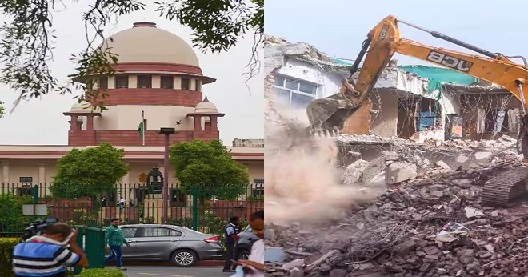Last Updated on September 2, 2024 11:34 pm by INDIAN AWAAZ
Staff Reporter / New Delhi
The Supreme Court on Monday (September 2, 2024) questioned the bulldozing of homes and private properties of persons accused of crimes or even their relatives by States as a possible act of public retribution, saying the law does not permit the destruction of the family shelters of even convicts.
“How can anybody’s home be demolished because he is an accused in a case? The law does not permit that… Can it happen even if a person is a convict?” Justice B.R. Gavai, heading a Bench with Justice K.V. Viswanathan, asked.
Hearing a number of pleas challenging bulldozer actions across many states, the top court asked, “How can a demolition take place even if someone is accused?”.

“The property cannot be demolished even if a person is convicted,” it said.
“Even if he is a convict, still it can’t be done without following the procedure as prescribed by law,” the bench said.
“A father may have a recalcitrant son, but if the house is demolished on this ground… this is not the way to go about it,” Justice Viswanathan said.
However, the court made it clear that it would not protect any unauthorised constructions.
The bench also asked the parties to submit draft suggestions which can be considered by the court to frame the pan-India guidelines.
“Let us try to resolve the issue on pan-India basis,” the bench said while posting the matter after two weeks.
It posted the matter for hearing on September 17.
A batch of petitions was filed before the Supreme Court in 2022, in connection with the demolition drive scheduled for April, of the same year, in Delhi’s Jahangirpuri.
While the drive was stayed, the petitioners prayed for a declaration that authorities could not resort to bulldozer actions as a form of punishment.
One of these petitions was by former Rajya Sabha MP and CPI(M) leader Brinda Karat.
During a hearing in September 2023, senior advocate Dushyant Dave (appearing for some of the petitioners) voiced concerns about the rising trend of state governments demolishing the homes of people accused of crimes, emphatically stressing that the right to a home was a facet of the right to life under Article 21 of the Constitution.

